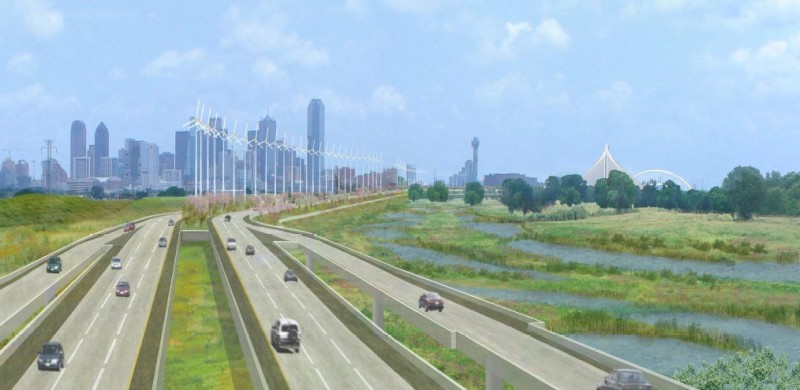For years, Dallas residents have waged a campaign against a plan to construct a nine-mile, six-lane toll road next to the downtown-adjacent Trinity River.
The Trinity Parkway, as it's known, would cost $1.5 billion, further entrench car dependence, and ruin riverfront parkland and natural habitat. Regional transportation planners and Mayor Mike Rawlings have pushed for it, but local advocates pushed back. Now, after a sustained campaign that turned highways and transportation into a central issue in local elections, the political winds have shifted.
Robert Wilonsky at the Dallas Morning News reports that a majority on the City Council intends to kill the project once and for all:
But -- and I can't believe I'm typing this -- the giant Trinity River toll road may be days away from its final demise. This is not another tease. This is real. Almost surreal. For years I've taken people down to the floodway and pointed to the earthen levees and said can you freaking believe how foolish this city is for wanting to build a massive highway next to a forever-promised park and a river that's supposed to flood.
Yet some time next month, perhaps as early as Aug. 9, the Dallas City Council will finally vote on lopping off the noggin of the Trinity River toll road or the Trinity Parkway or the Underwater Zombie Tollroad or whatever you want to call that four-but-probably-six-lane, 9-mile slab of cement some folks have been wanting to plant along the river's East Levee since forever. Looks like the new City Council, a majority of whom oppose a high-speed road in the Trinity, is prepared to do what its predecessors refused to do as recently as two years ago.
On Friday, five council members -- Sandy Greyson, Scott Griggs, Philip Kingston, Adam Medrano and newcomer Kevin Felder -- sent Mayor Mike Rawlings and City Manager T.C. Broadnax a memo demanding they put on the next available council agenda a resolution that would once and forever reject the only version of the toll road, the so-called Alternative 3C, to receive the feds' blessings.
The next voting agenda is Aug. 9, but Rawlings — who said he "thought this would be coming, after the election and stuff" — told me Monday it may take a little longer. The city attorney's office is drafting the resolution, which, he said, the five would then have to approve before it goes to a vote.
Kudos to the volunteers and advocates, including Patrick Kennedy, who annihilated the region's case for the highway and built a political coalition around smarter ways to plan for growth. If Dallas can recognize the futility of adding highway lanes, other cities have no excuse for letting these boondoggles move forward.
More recommended reading today: Darin Givens at ThreadATL reports that almost none of the new housing being built in walkable, transit-accessible areas of Atlanta are affordable to low- and middle-income residents. And Alex Block says that in light of the D.C. Metro's financial crunch, WMATA should consider selling off some of its money-losing parking lots.





